Recently, I announced that I had become an evolutionary creationist (more commonly known as “Theistic Evolutionist). I now believe based on my studies of The Bible and science that God created all of biological life through the process of biological evolution; natural selection acting on random mutation. You can see my announcement posts here and here. I have been asked by a few people which books most heavily influenced my thinking into accepting this view, so in this blog post I will list the top 5 I found had the biggest impact on my thinking.
Book 1: “Origins: Christian Perspectives On Creation, Evolution, and Intelligent Design” by Deborah and Loren Haarsma
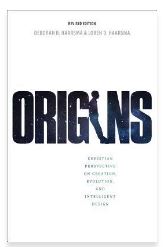 This book written by two Christian astrophysicists went a long way in making me open to Evolutionary Creationism (a.k.a Theistic Evolution). One of the things I like about it is that it doesn’t really tell you what to think and why. It just surveys the main positions on science and faith held by believers, those from the young earth camp, the old earth camp, and the evolution camp. They talk about the strengths and weaknesses of all of the views (including the ones the authors hold), and I think they do a good job of accurately representing the differing views. They do make their position known and they do go into reasons as to why they hold the positions they do, but they made it clear that their number 1 goal is to just get you to think about these issues and see that the list of options is much wider than just young earth creationism or atheistic evolution (a very common false dichotomy pushed today).
This book written by two Christian astrophysicists went a long way in making me open to Evolutionary Creationism (a.k.a Theistic Evolution). One of the things I like about it is that it doesn’t really tell you what to think and why. It just surveys the main positions on science and faith held by believers, those from the young earth camp, the old earth camp, and the evolution camp. They talk about the strengths and weaknesses of all of the views (including the ones the authors hold), and I think they do a good job of accurately representing the differing views. They do make their position known and they do go into reasons as to why they hold the positions they do, but they made it clear that their number 1 goal is to just get you to think about these issues and see that the list of options is much wider than just young earth creationism or atheistic evolution (a very common false dichotomy pushed today).
One of the most memorable points they made was in chapter 1 in which they give an example of the way weather operates. They point out that The Bible clearly teaches that God governs the weather and yet we also know of solid and proven natural explanations for how the weather operates. Dr. Haarsma points to several Bible passages proclaiming that God causes rain and drought (see Deuteronomy 11:14-17; 1 Kings 8:35-36; Job 5:10; Job 37:6; Jeremiah 14:22), and they note that the writers of Deuteronomy, the Psalms, and Jeremiah refer specifically to storehouses of rain and snow (Deuteronomy 28:12, 24; Psalms 135:7; Jeremiah 10:13). Deborah and Loren Haarsma go on to point out the natural explanations behind these. They write “…water evaporates from the ground level, rises to where the air is cooler, and condenses into water droplets that form clouds. We learned how cold fronts and warm fronts and low pressure systems bring rain. When we watch meteorologists on television, we hear that scientists now use sophisticated computer models to help them understand and predict the weather a few days in advance. Their ability to understand meteorology is especially important for farmers, airline pilots, military personnel, and coastal residents. Every year scientists develop increasingly accurate computer models of the weather.”
Dr. Haarsma then invites us to imagine heated debates between whether The Bible is correct or whether the natural explanations of weather are correct, and to imagine lawsuits being filed against schools for teaching the natural explanations, and so on. The Haarsmas then write “The majority of Christians say that when it comes to the weather, both science and the Bible are correct. God governs the weather, usually through the scientifically understandable processes of evaporation and condensation. And the majority of atheists today would also agree that having a scientific explanation for the weather, by itself, neither proves nor disproves the existence of God.”
Their conclusion is that we would never conclude that natural explanations behind the weather would contradict scripture and leave God with no role to play in the process, so why do it with evolution?
I agree with them. The Bible is correct that God controls the weather, but he uses nature to do it. In the same way, God created all of life. Could He not have used evolution to do so? Natural explanations and theological explanations are not mutually exclusive. In answer to the question “How did the human race come to be?” The statements “We were created by God” is not the negation of “we evolved”.
Book 2: “How I Changed My Mind About Evolution” edited by Jim Stump and Kathryn Applegate
This book isn’t a science textbook, nor is it a theology textbook. This book is a compilation of personal testimonies of Christians who struggled to reconcile what they believed was true theologically and what they believed was true scientifically, and how these people came out on the other side with their faith intact. They found that they didn’t have to throw out what scientists said nor did they have to throw our their Bibles. Science and Faith can exist in harmony. Now, while this isn’t a science or theology textbook, this isn’t to say that theology or science isn’t discussed. It would be a pretty lame (not to mention unimpactful) book if that were the case. Each essay is authored by a different individual and some of those individuals, embedded within their own personal testimonies/stories, talk about theology and science, and some of the satisfying answers they came to. Dennis Lamoroux, for example, talks about a lot of the scientific evidence for evolution. He probably does more so than any other author in the book. This book is twenty-five narratives of Christians who accept evolutionary creation and how, in most cases, they changed their minds in reaching this conclusion (as the title suggests).
Book 3: “The Lost World Of Genesis One” by John Walton
This book was a fascinating read from beginning to end. In this book, John Walton makes the case that Genesis One is an account of functional origins rather than material origins. By that, he means that Genesis One was never intended by Moses to be an account of natural history, but an account of God’s decreeing of what each particular function each object in creation should have. And moreover, that the author of Genesis views the universe as “God’s Cosmic Temple”, and the 7 days depict the inauguration of it. Walton defends this view from textual evidence both inside The Bible and outside The Bible (I.e ancient near eastern literature).
After reading the book, I have come to the conclusion that “The Cosmic Temple Inauguration” or “Functional Ontology” interpretation (whatever label you want to slap on it) has a lot going for it.
Book 4: “The Lost World Of Adam and Eve” by John Walton
I don’t think it would be overselling it to say that John Walton’s “The Lost World Of Adam and Eve” is the most persuasive Evolutionary Creationist treatment of the topic of Adam and Eve I have ever read. First of all, Walton takes Adam and Eve to be historical individuals and takes Genesis 2-3 to be referring to real events in time and space, and does so for the very same reasons young earth and old earth creationists do (e.g the genealogies, Paul’s teaching in Romans 5). I was quite pleased with this as too many evolutionary creationists are quick to relegate The Bible’s opening chapters to myth or allegory, to label it as just one big parable. They say that real biblical history begins with Abraham in Genesis 12. I find this view untenable because it makes the genealogies in the Chronicles and the gospel of Luke either in error or unintelligible (because it’s nonsense to trace a historical figure, Jesus, back to a fictional person, Adam) and because Romans 5 would also be unintelligible as it’s impossible for a fictional person to bring sin and death upon the whole human race. Walton agrees, and he does not take this more liberal view of the text. He affirms the historicity of Adam and Eve and their fall.
Walton, however, argues that Genesis 2-3 is not concerned with telling us the material origins of Adam and Eve, but about the story of Adam and Eve as archetypes of humanity and as priests in God’s “cosmic temple” to serve in “sacred space”. Walton also argues that The Bible as a whole does not require us to view Adam and Eve as THE first man and woman. There is room for seeing them as one couple among others. With regards to Adam’s creation, Walton appeals to several references from the Old Testament, Walton shows us that for Genesis 2 to say Adam was “made from dust” is likely not meant to say Adam was literally transformed into a man from a pile of dust, ergo having no parents and not being descended from pre-human hominids. Rather, we are all made from dust. Psalm 103:13-16 says “As a father has compassion for his children, so the Lord has compassion for those who fear him. For he knows how we were made; he remembers that we are dust. As for mortals, their days are like grass; they flourish like a flower of the field; For the wind passes over it, and it is gone, and its place knows it no more.” (emphasis mine) Ecclesiastes 3:19-20 says “The fate of humans and the fate of animals is the same; as one dies, so dies the other. They all have the same breath, and humans have no advantage over the animals; for all is vanity. All go to one place; all are from the dust, and all turn to dust again.” (emphasis mine). Abraham and Job also talk about themselves as being made of dust. Now, since Abraham, Job, the Psalmist, and you and I clearly have human parents and aren’t miraculously transformed dirt, why do we think the “made from dust” language in Genesis demands we think Adam didn’t have parents?
Walton’s point is that the Genesis text is just saying God created Adam mortal, rather than literally scooping up a handful of dirt and miraculously transforming it into a person. Genesis 2 is presenting Adam as archetypal of all people. All of us are made of dust. All of us are mortal. Of course, it has been traditionally been held by many Christians that humans were originally created immortal, and ergo Walton’s view contradicts The Bible. Doesn’t Romans 5 say that death was brought to humanity through Adam’s sin? Yes, it does. But this doesn’t mean that humans had inherent immortality. Walton points out that God had placed a tree in the garden called The Tree of Life. When Adam and Eve sinned, they were cast out and barred access to it. Genesis 3:22 gives the reason: so that they can’t reach out for it, eat of it, and ergo live forever. Walton rightly points out that a Tree of Life is superfluous to creatures who have immortality in and of themselves. Death came to humanity by being barred access to the tree of life, not by having an inherent ontological immortality stripped of them.
Walton also points out that In Genesis 4, Cain is driven away from his homeland, and presumably from his family, but Cain is scared of people who might find him and kill him. Cain is later the founder of a city. To be a “city”, there would have to be a large number of people. This seems to imply that other people besides Adam, Eve, and a few of their children were around.
Walton draws his conclusions heavily from the biblical text itself but, like his previous work The Lost World Of Genesis One, he draws from Ancient Near Eastern literature as well, because the cultural context of the text can help shed light on it.
I recommend this book to those who are interested in studying the creation/evolution debate, and I recommend it to those who are convinced of Darwinian macro evolution but are also convinced that The Bible is God’s Word, and that proper exegesis leads to a view of Adam and Eve as historical individuals, but are uncertain of how to harmonize these two conclusions.
Book 5: “Deliver Us From Evolution?” by Aron R. Yilmaz
I’ve saved the best for last. This book was one of the most powerful defenses of Evolutionary Creationist that I have ever come across. While other Evolutionary Creationist books that I have read thus far tend to focus primarily on the compatibility of Christianity and evolution, Yilmaz actually spent an equal amount of time addressing both (1) Christianity and evolution’s compatibility and (2) the scientific evidence for Darwinian Evolution.
In the case of the latter, Yilmaz presented a very powerful case for macro evolution and responded to many of the rebuttals special creationists typically raise in response to that evidence. Furthermore, Yilmaz had read a ton of Intelligent Design material prior to his becoming a proponent of evolution, including Lee Strobel’s The Case For A Creator. He also used to be an ID proponent himself. This puts Yilmaz in an excellent position to have knowledge of the arguments and counter-arguments on both sides. Yilmaz’ case was so strong that it blew my mind! After the first time I read it, I was like “Dang! This stuff might very well be true!” After the third read, I decided “It’s time to poo or get off the pot. The evidence Yilmaz has presented is overwhelming. It’s time to fall off the fence.” Yilmaz discussed evidence for common ancestry that I had never even heard before, such as Psuedogenes, Avatisms, and Endogenous Retroviruses. We humans share thousands of psuedogenes, atavisms, and endogenous retroviruses with the great apes. In fact, as I was reading about this genetic evidence for common ancestry, I couldn’t help but think “These seem like powerful arguments for common ancestry. Why have they not been discussed in the ID literature? Even if they gave bad responses, one would expect responses to at least be present” Moreover, Aron Yilmaz addresses the ludicrous “It’s an atheist conspiracy” line of thinking that I’ve seen prevalent in YEC and ID literature, even in works such as Lee Strobel’s The Case For A Creator and Frank Turek’s I Don’t Have Enough Faith To Be An Atheist, and in movies such as “Expelled: No Intelligence Allowed”. I myself used to hold to this line of thinking, but Yilmaz has shown me how absurd it is. He shows statistics that 99% of scientists accept Darwin’s theory and yet around 30% of them are also theists (whether Christian, Jew, Muslim, or what have you), so if the wide acceptance of Darwinian Evolution were based on the strong desire to explain origins without God, why would so many theistic scientists embrace it? Maybe it isn’t a conspiracy. Maybe, just maybe, it’s true, as the scientific evidence seems to indicate.
I will say that I was a little disappointed with the semi-final chapter, where Yilmaz attacks Irreducible Complexity and Specified Complexity. I’ve read Behe’s and Dembski’s work and it was apparent that Yilmaz did not understand the logic undergirding their inferences to design, and invalidly accused them of committing logical fallacies that I don’t think they committed. He also seemed to contradict himself when he criticized William Dembski and Stephen Meyer for using improbabilities in arguing against abiogenesis when he himself used improbability in a prior chapter to argue that the various different kinds of great apes couldn’t have ended up with the same endogenous retrovirus in the exact same place in their genomes by mere happenstance. Was that not a “Gee Wiz” improbability argument? His arguments against Intelligent Design at the origin of life were pitiful, and it’s why I still think the ID community has a case at the level of the origin of first life (not to mention of the cosmic and local fine-tuning).
As far as books convincing me that the scientific theory is correct, this one ranks number 1. Other Theistic Evolution books helped me work out the issue theologically, but this book convinced me of evolution scientifically.
Conclusion
Other books also influenced by thinking such as Francis Collins’ best seller The Language Of God: A Scientist Presents Evidence For Belief and Dennis Lamoroux’s Evolution: Scripture and Nature Say Yes. but the 5 books presented above were the most influential. However, just as influential than the books were the various blog posts written by the staff at www.biologos.com. BioLogos blog posts were just as influential as the books I mentioned above.


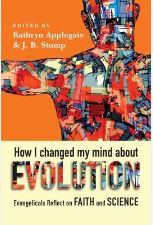
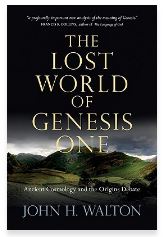
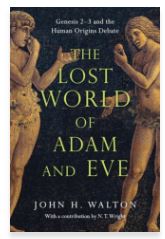
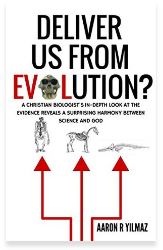

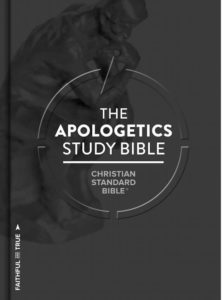
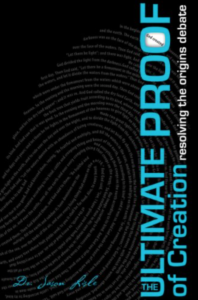
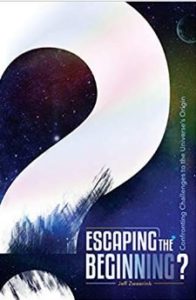
Thank you for the article. One issue that concerns me with regard to Evolutionary Creationism is from the perspective of a moral argument against it. IF God used eons of evolutionary processes to create humanity, what about all of the suffering and death involved in the process? In other words, if God is concerned with suffering, why use a process to create that involves so much death and suffering? Do any of these books, to your knowledge, address this question? Blessings!
I sympathize with your struggle. This is an objection that affects ALL old earth models of creation, and it was one of the things I had to wrestle with too.
While none of the 5 recommended books here address one-half animal death from a moral perspective (they mainly concern themselves with the scriptural arguments against it, such as the argument from Romans 5), I do address it in my blog post "Why Pre-Fall Death Isn't A Problem For Old Earth Creationism" under the third subsection.
http://cerebralfaith.blogspot.com/2017/06/why-pre-fall-death-isnt-problem-for-old.html
The inclusion of death and suffering is an integral part in the process of redemption. Just look at the suffering and death of Jesus, which God ordained as the way of salvation for all. Is it any surprise we see this pattern and process also included in there natural world?
I have a questions for you – did God direct evolution directly? meaning you would subscribe to guided evolution?
In a way. As a Molinist, I believe that God used his middle knowledge to guide the process of evolution, just as He uses His middle knowledge to orchastrate the events in human history, such as the crucifixion of Jesus (Acts 2:23). God acted on His knowledge of what nature WOULD do in any given circumstance.
But then, Evan, would not your view by identical to that of Intelligent Design proponent Michael Behe? My understanding of the BioLogos view is they they engage in a sort of theological double-talk in regard to evolution. They say they accept Neo-Darwinian evolution but claim God guided it somewhow. Yet it is incoherent to say God could direct a random process. At least that is how I understand their view – otherwise there’s be no difference between their view and the ID crowd. Yet BioLogos vigorously rejects ID.
No. Behe is a Progressive Creationist. He believes God directly intervened at certain points in evolutionary history to cross the boundaries that natural processes couldn't overcome.
Also, you're objection that "it is incoherent to say God could direct a random process." is a common objection to evolutionary creationism that commits the fallacy of equivocation. When scientists use the term "random" regarding mutations in biology, they are not using the term as a synonym for "chance" or "purposeless". Rather, when biologists use the term "random mutations" they mean that the mutations are not predicable.
Deborah and Loren Haarsma point this out in their book Origins: Christian Perspectives On Creation, Evolution, and Intelligent Design. They write:
"When scientists say that something is random, they mean that the outcome is unpredictable. Consider the roll of a pair of dice. Scientists can calculate the probability that the roll will yield a five or an eleven, but they can't predict what any particular roll will turn out to be. It's not that some mysterious force is at work making the dice roll differently each time. Rather, each time the dice are rolled they follow exactly the same well-understood natural laws of gravity and motion. The dice land differently each time because of how they bounce and spin. If the dice are tossed even slightly differently from one time to the next, that slight difference is magnified by each bounce, and after several bounces the final outcome is completely changed. The system is scientifically random because the outcome is unpredictable."
Given this definition of randomness, there's no contradiction is saying that God guided evolutionary history to produce the kinds of creatures He wanted to create. God can do many things that are impossible for human beings to predict. The disciples of Jesus did not predict that Jesus would rise from the dead. The resurrection came as a complete shock to them! That's why they were hiding in fear of the Jews (John 20:19), and why they dismissed Mary Magdalene's words as "idol nonsense" when she told them that she had seen the risen Jesus (Luke 24:11). You yourself can probably think of many other things God has done, both in your own life and in scripture that were "random" in the sense of being unpredictable.
**My understanding was that Behe believed in a sort of God-directed evolution. That is, he believes that God ultimately directed evolution but other than that he accepts the traditional evolutionary story. On the other hand, I’d categorise Stephen C Meyer as more of a progressive creationist.
YOU SAID: “Rather, when biologists use the term "random mutations" they mean that the mutations are not predicable”
I’m not sure what you quite mean here? It seems to me like the BioLogos folk are importing teleological assumptions into their understanding of “random”. Because Methodological Naturalism which underlies the practice of biology and the interpretation of evolutionary data explicitly excludes any implication of teleology in the process evolution.
It seems to me like, In order to be consistent, you’d have to reject Neo-Darwinism (natural selection acting on random mutation) because if one believes that God is ultimately directing evolution then one is implicitly rejecting evolution as understood by Neo-Darwinists (which is confusing because “evolutionary creationists”/the BioLogos version of “theistic evolution” seems to think Neo-Darwinism is compatible with theistic evolution). An example of someone who rejects the BioLogos view is JP Moreland who contributed to a work entitled “Theistic Evolution” & recently did a talk on the topic at Biola (I believe). That said, I don’t think this whole area is critical – but as someone who reads philosophy, the philosophy of science and is interested science – the BioLogos position doesn’t make much sense to me and, I think after the aforementioned book was released, will probably lose some ground in the debate.
Let me know your thoughts! Because it seems like we are both interested in the area but clearly we came to different conclusions.
BioLogos does believe the evolutionary process was teleological, as do I. But this flows out of our religious conviction that Christianity is true and, as The Bible says, God is the creator of all things (Genesis 1, John 1:1-3). What Evolutionary Creationists do a good job of pointing out ((as well as non-theists like Francisco Ayala)) is that the theory of evolution is inherently neutral with regards to whether or not a divine mind was driving it towards any goal in mind.
"Random" mutations should not be heard as "purposeless" or "chance" mutations. As the Haarsma quote said above, when scientists describe a scientifically unpredictable process, they call it a "random" process, since there is no rhyme or reason ((from our human standpoint)) for the system to occur in the way it does. Why a mutation happens in this part of the gene at this time in this animal rather than some other part of the gene at some other time, scientists cannot explain.
God can certainly guide "random" events in this sense of the word. This definition of "random" can be applied to dice rolls. In fact, in the ancient world they had something very similar to dice called "lots". Proverbs 16:8 says "The lot is cast, but its every decision is from the Lord."
The" interpretation of evolutionary data [that] explicitly excludes any implication of teleology in the process evolution." is the atheistic interpretation of the theory, and this should not be taken as inherent to the theory itself.
Indeed, as I've argued elsewhere on this website, to draw disteleology from the theory of evolution is a question begging assumption. IF atheism were true, then of course the evolutionary process would be purposeless and undirected. After all, if atheism is true, then there is no God to guide the evolutionary processes, and if there is no God to guide the evolutionary processes, then whatever happens in the biological history of the universe is a blind, purposeless, accident of chance and necessity. But that's a conclusion about evolution one can only come to after one concludes that atheism is true! You can only conclude that evolutionary history had no purpose if you presuppose atheism. In that case, it's circular reasoning to argue TO atheism FROM the theory of Darwinian Evolution.
In order to determine whether evolutionary history had any purpose, one needs to look to other fields of knowledge besides biology.
You haven't really given me anything to disagree with here. I agree that your view is a coherent one – similar to the view set out by Plantinga in "Where the Conflict Really Lies". However I simply reject your interpretation of the BioLogos position. If BioLogos truly believes what you say they believe then there is no substantive difference between them and the ID crowd! ID makes no specific claim as to whether the earth is young or old nor does it attack how evolution happened. It simply asserts that there is design in nature. I consider myself well qualified to make this point because I have read tons of ID books and thoroughly know their position as a result. Sure, some ID proponents are personally young-earth and old-earth creationists – but that doesn't enter into their ID work. What Behe believes is identical to what you think the BioLogos position is. Thus I ask – why does BioLogos oppose ID if you explanation of their position basically identical to the ID one?
I too have read a bunch of ID books, and while some ID proponents accept a large amount of common ancestry, the view differs from the BioLogos position in how much direct divine intervention was needed to bring about the life that exists. As you said, some ID proponents reject common ancestry outright and say that God must miraculously have poofed creatures into being, while others say that God only had to periodically intervene in the natural processes to overcome hurdles nature couldn't accomplish on its own.
I would posit direct divine intervention at the level of the origin of the universe (The Big Bang), the cosmic fine-tuning of the universe, and the origin of the first single celled organism. The Local Fine-Tuning and the evolution of life over the eons, I would attribute to God's "ordinary providence".
Of course, that's MY position. The people at BioLogos don't even think direct intervention is needed to explain the origin of first life (contra me). They think even THAT can be accounted for through God's ordinary providence.
Ok, well then I largely agree that what you stated – as to your own view – is plausible. I am personally an old-earth creationist who does think God intervened periodically in creation (such as with the special creation of man as an example) which is basically the view I understand Stephen C Meyer to have. Although I ultimately think this whole area is a secondary issue. If I was to argue for the existence of God, for example, I'd be much more inclined to go for the philosophical arguments in showing evidence for God.
As a fellow evolutionary creationist, I would recommend these additional must-read books:
1. Kyle Greenwood, Scripture and Cosmology: Reading the Bible Between the Ancient World and Modern Science (Downers Grove, IL: IVP Academic, 2015).
2. Denis R. Alexander, Creation or Evolution: Do We Have to Choose?, 2nd ed. (Oxford, UK: Monarch Books, 2014).
3. Darrel R. Falk, Coming to Peace With Science: Bridging the Worlds Between Faith and Biology (Downers Grove, IL: IVP Academic, 2004).
4. Gerald Rau, Mapping the Origins Debate: Six Models of the Beginning of Everything (Downers Grove, IL: IVP Academic, 2012).
5. Jim B. Stump, ed., Four Views on Creation, Evolution, and Intelligent Design (Grand Rapids, MI: Zondervan, 2017).
6. Nancy Morvillo, Science and Religion: Understanding the Issues (Malden, MA: Wiley-Blackwell, 2010).
7. J. Daryl Charles, ed., Reading Genesis 1–2: An Evangelical Conversation (Peabody, MA: Hendrickson Publishers, 2013).
656966 981127Woh I like your content material , saved to favorites ! . 140797
874634 648880Superb read, I just passed this onto a friend who was doing some research on that. And he truly bought me lunch since I located it for him smile So let me rephrase that: Thank you for lunch! 305280
I do believe that its possible that God guided evolution but then why so many flaws in our design like the vitamin C ordeal and well Not Very Intelligent Design by Neel Ingman Highlights the issue (in very crude fashion by the way) perhaps God thought it was irrelevant or I don’t know.